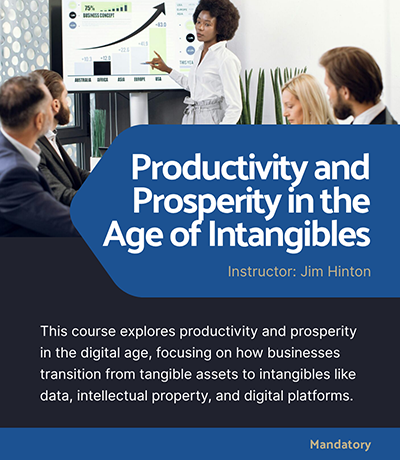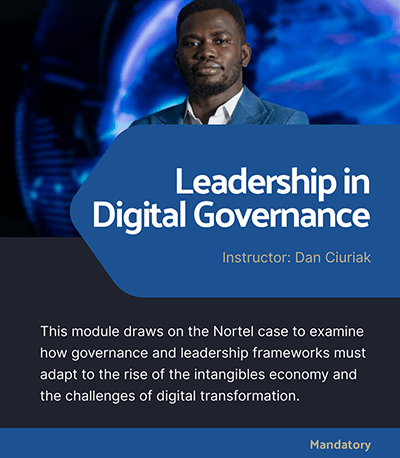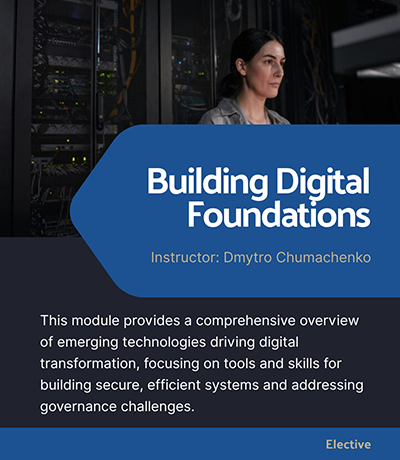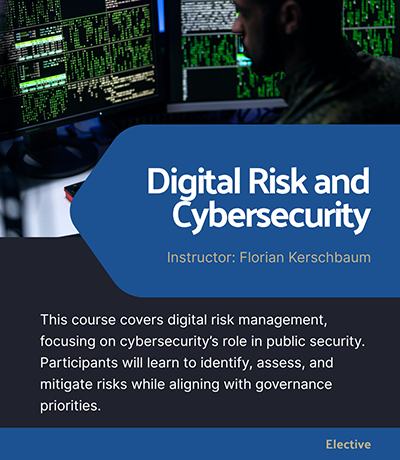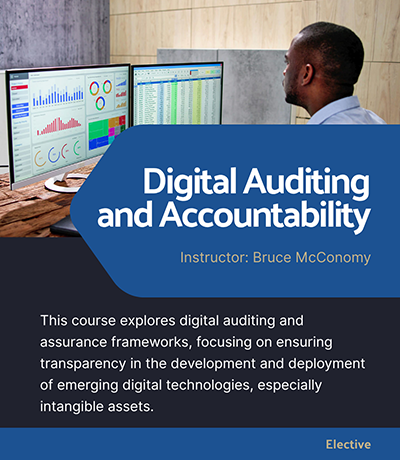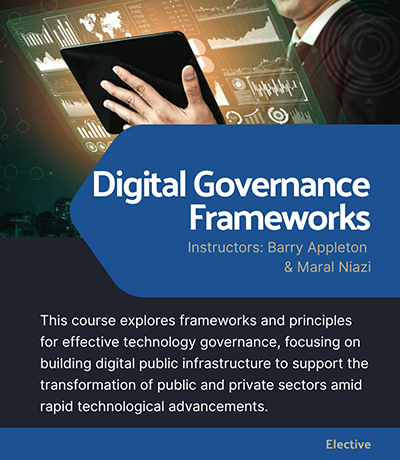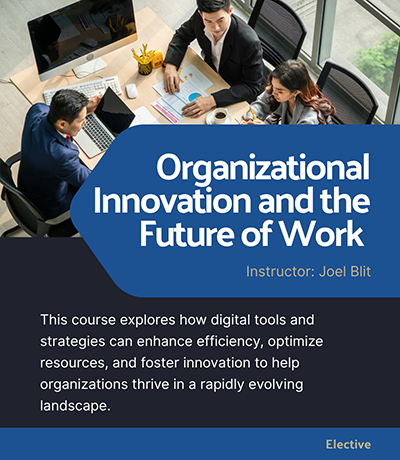Shape the future of innovation: your time, your terms, real impact
The Balsillie Executive Institute’s suite of on demand modules on Digital Policy Innovation is designed for professionals, policymakers, and entrepreneurs navigating today’s increasingly knowledge-based, digital economy.
All eight modules are offered in a self-paced, asynchronous format, making it easier than ever to gain in-depth knowledge and skills—no matter where you are in the world or how busy your schedule may be.
OnDemand Modules
What you will learn
The Age of Intangibles signifies a profound shift in economic and societal paradigms, where value creation increasingly hinges on non-physical assets such as data, algorithms, intellectual property, and digital platforms. This transformation reshapes traditional governance models, economic activities and frameworks, financial investments, and legal norms, influencing innovation priorities, strategic leadership, productivity dynamics, resource distribution, and wealth generation.
To navigate the distinct complexities this era presents, this executive program offers eight self-guided modules aimed at equipping current and future leaders alike with the critical knowledge and practical skills required to lead digital transformation and effectively manage this era's risks and opportunities.
Who benefits from this program?
This executive program is designed for all levels of professionals driving digital transformation, policy-making, and governance initiatives. The course is particularly valuable for civil servants, lawmakers, civil society leaders, scholars, and graduate students committed to shaping digital governance strategies and policies.
The thoughtfully crafted modules provide participants with a comprehensive understanding of the unique complexities and interconnections that define the Age of Intangibles. They are also offered individually, with different levels of commitment (Audit Only and Executive Module).
Choose your learning path
We understand that professionals have different goals and time commitments. That is why the Digital Policy Innovation suite offers three flexible pathways for engaging with our content—whether you are here to explore a single topic or to earn a recognized credential.
Audit Only
This option is ideal for professionals who want a high-level overview of a topic without the pressure of assessments.
Access to:
✔ One module of your choice
✔ Video lectures, readings and quizzes
✔ Asynchronous discussion forums
As this pathway doesn't require the submission of a case study response, no certificate will be awarded.
Executive Module
This pathway is ideal for those seeking recognition for professional development in a targeted area. Going beyond passive learning, this option includes an assessment of the knowledge gathered through a response to a real-world application of the topic covered.
Access to:
✔ One module of your choice
✔ Video lectures, readings, and quizzes
✔Case study materials
✔ Feedback from module instructor
✔ Asynchronous discussion forums
Participants are required to submit a case study response to receive feedback. Upon successful completion of the module, participants are awarded with a Certificate of Completion (badge).
Executive Certificate
This is our most comprehensive option, offering a broader foundation in innovation and intangible asset strategy. It is perfect for professionals pursuing a recognized credential to demonstrate advanced understanding and applied skills in intangible innovation strategy.
Participants gain access to a total of five modules—two required core modules and a choice of three electives from a curated selection of six. The core modules provide foundational knowledge to evaluate the economic impact of intangible assets and lead effectively in digital governance. Elective modules offer specialized skills for addressing policy challenges, fostering innovation, and designing ethical, future-ready digital solutions.
Access to:
✔ Five modules: 2 required core modules and a choice of 3 electives
✔ Video lectures, readings, and quizzes
✔ Case study materials
✔ Feedback from module instructor
✔ Asynchronous discussion forums
To earn the Executive Certificate, participants must complete all five selected modules and submit corresponding case study responses. Successful completion results in a micro credential in Digital Policy Innovation.
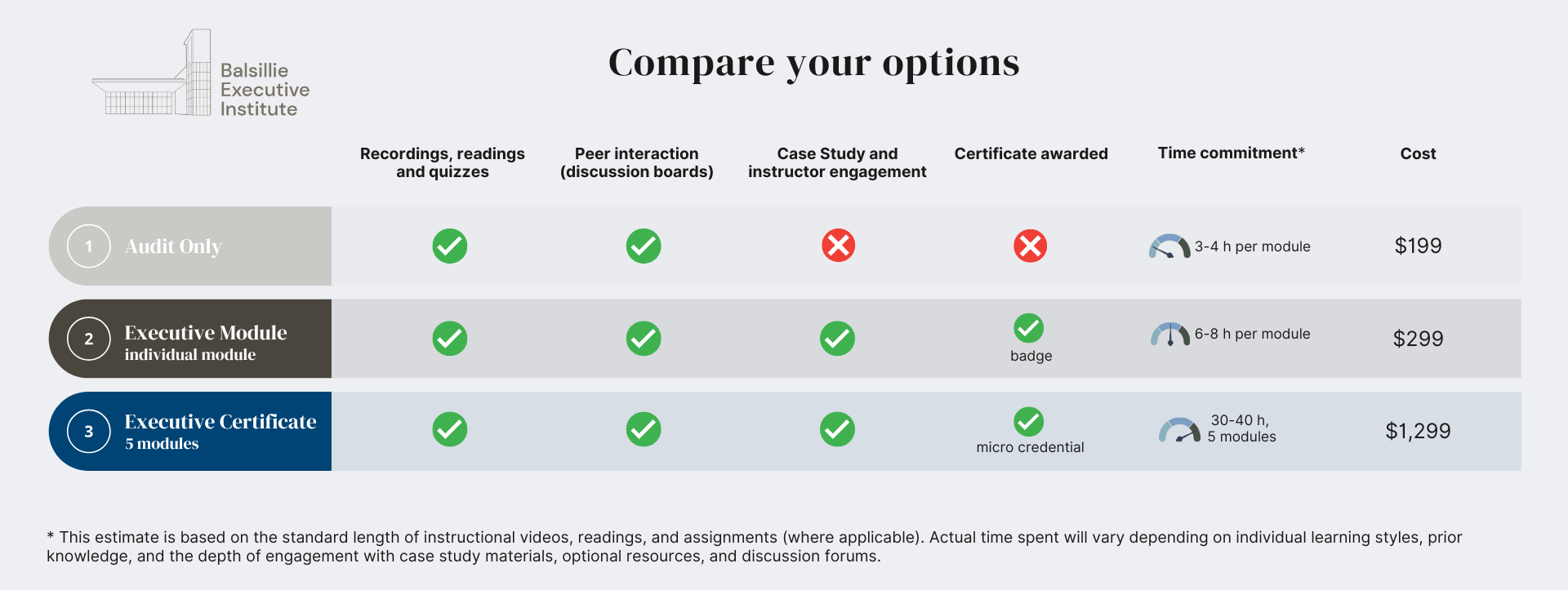
Flexible format, executive-level depth
Course Delivery
The self-paced, asynchronous format is designed to provide the same depth and quality as traditional delivery, with the added convenience of learning on your own schedule.
Each module includes:
- A total of three hours of pre-recorded sessions, divided into 30-45 minutes topical sub-sessions.
- Access to supporting material, including recommended readings and flexible, self-directed exercises.
- Access to discussion boards, giving participants the opportunity to engage with the module instructor and fellow participants through dedicated forums where questions, insights, and case reflections can be shared.
- An applied case study, accompanied by a pre-recorded introduction from the instructor and feedback on the assignment.
Course Assessment
Engage with dynamic case studies through on-demand simulations designed for independent learning.
Participants will be assessed based on a one-page submission responding to a task that applies module learning objectives to the case study context. Completion of this assignment is required for obtention of a certificate in the 'Executive Module' and 'Executive Certificate' pathways.
